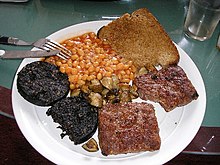Greasy spoon

Greasy spoon is a colloquial term for a small, cheap restaurant or diner typically specialising in fried foods.[1] According to the Oxford English Dictionary, the term originated in the United States[2] and is now used in various English-speaking countries. Originally disparaging, the term is now more frequently used in an endearing sense.
The name "greasy spoon" is a reference both to the typically high-fat, high-calorie menu items at such places, for example eggs and bacon, and to the supposed general standard of cleanliness. The term has been used to refer to a "small cheap restaurant" since at least the 1920s.[3]
United States


Many typical American greasy spoons focus on fried or grilled food, such as fried eggs, bacon, burgers, hash browns, waffles, pancakes, omelettes, deep fried chicken, and sausages. These are often accompanied by baked beans, french fries, coleslaw, or toast. Soups and chili con carne are generally available.
Since the 1970s, many Greek immigrants have entered the business. As a result, gyro and souvlaki meats are now a common part of the repertoire, often served as a side dish with breakfast and as a replacement for bacon or sausage.
A full meal may be available for a special price, sometimes called a blue-plate special. Regional fare is often served. Coffee, iced tea, and soft drinks are the typical beverages, and pie and ice cream are popular desserts.
United Kingdom

In the UK, greasy spoons typically offer a wider range of foods, often taking advantage of inexpensive seasonal ingredients. In the United Kingdom, greasy spoons are also commonly referred to as "cafes" (occasionally as "working men's cafes") and colloquially as "caff"./ˈkæf/[4][5][6] Not all cafes are greasy spoons, however. A greasy spoon in the UK is commonly an independently owned business and rarely, if ever, part of a chain or group. Increasingly, they are gradually being forced out of business by large coffee house chains and fast food franchises.[7]
The typical working men's cafe serves mainly fried or grilled food, such as fried eggs, bacon, black pudding, bubble and squeak, burgers, sausages, mushrooms and chips. These are often accompanied by baked beans, cooked tomatoes, and fried bread. These are served in a variety of combinations and are generally referred to as "breakfast" even if they are available all day.[8]
Hot and cold sandwiches are also often available: the bacon butty and sausage sandwich are particularly popular. The main drink in a British working men's cafe is usually tea, especially "builder's tea" (a nickname for a mug of strong black tea, such as English breakfast tea, usually served with milk and sugar and is typically robust and flavourful with a brisk character and a dark red colour). Often the only coffee available will be instant, though this has slowly changed with the increased proliferation of coffee drinking. British working men's cafes will sometimes also offer bread and butter pudding, apple crumble, and rhubarb crumble.
The greasy spoon was the mainstay of British lorry drivers who travelled the major trunk roads such as the A1 and the A6 prior to the opening of the motorways. These cafes were not only stops where the driver could eat, but also made convenient meeting places where the trade unions could talk to their members.[9] In 2001, the UK press reported that the European Union was attempting to ban greasy spoon cafes. This turned out to be a hoax, a fairly typical Euromyth based on an exaggeration of an EU report about eating habits of long-distance drivers and their health.[10]
In the United Kingdom, the traditional greasy spoon has been in sharp decline due to the rise of fast-food chains; they nevertheless remain numerous all over the UK,[11] especially in certain parts of London, Birmingham, Manchester, Derby, and in many seaside towns. The demand for their style of cuisine has resulted in the establishment of greasy spoons all over the world, and particularly in European coastal resorts located within an hour's coach ride from charter airlines' destinations, in which full breakfasts may be available all day.
See also
References
- ^ dictionary.com Greasy spoon
- ^ "greasy spoon" entry, OED
- ^ "Greasy". Online Etymology Dictionary. Retrieved 7 April 2012.
- ^ Take the Kids England, 3rd. Fullman, Joseph. New Holland Publishers, 1 June 2007. p. 21
- ^ Britslang: An Uncensored A-Z of the People's Language, Including Rhyming Slang Puxley, Ray. Robson, 1 April 2005. p. 216
- ^ Shorter Slang Dictionary. Fergusson, Rosalind; Partridge, Eric; Beale, Paul. Psychology Press, 1994
- ^ Greasy spoon caffs are crushed by coffee giants
- ^ We're British, Innit: An Irreverent A to Z of All Things British. Iain Aitch. HarperCollins UK, 1 October 2010 [1]
- ^ "In Ernie Bevin's Steps". Time Magazine. No. 2 September 2002. 1957.
- ^ "Our greasy spoons in a stir over EU". Daily Express: 29. 21 September 2001.
- ^ Steves, Rick (November 2007). Rick Steves England 2008. Avalon Travel Publishing. pp. 504pp. ISBN 1-59880-097-3.
External links
- Classic Cafes – The Very Best of London's Twentieth Century vintage Formica caffs
